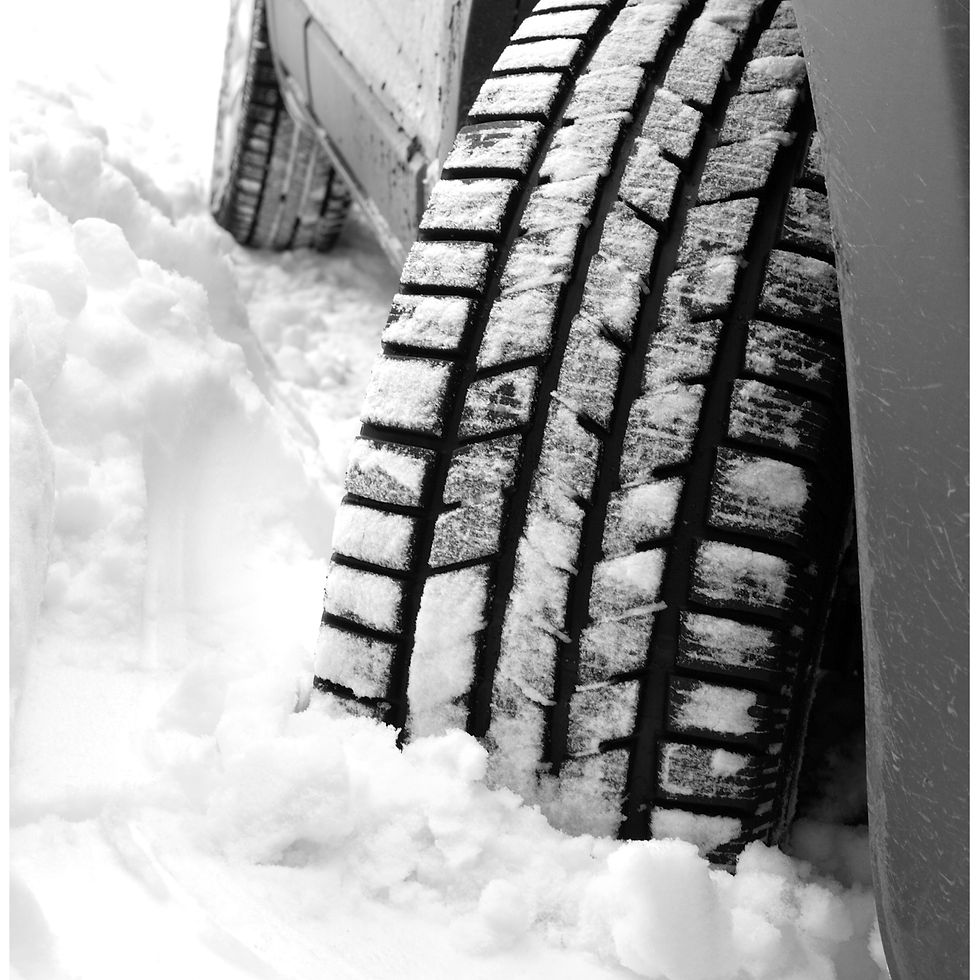How to choose between All Season Tires, Winter Tires, or All-Weather Tires? Which tire performs best in the Snow?
- Reliable Tire Service
- Dec 23, 2024
- 3 min read
The differences between all-season, all-weather, and winter tires mainly lie in their performance, design, and suitability for various weather conditions, especially in terms of snow, ice, and cold temperatures. Here's a detailed breakdown:
. All-Season Tires:
Purpose: Designed for use in a variety of conditions, including dry roads, wet roads, and light winter conditions. They are a good option for regions with moderate climates where snow and freezing temperatures are infrequent or mild.
Snow/Ice Performance: All-season tires can handle light snow or slush but are not optimized for severe winter conditions. They lose effectiveness in snow or icy conditions because their tread design and rubber compound aren't suited for extreme cold.
Tread Design: Moderate tread depth with a balanced pattern that works well on dry, wet, and lightly snowy roads but doesn't provide the maximum traction needed for harsh winter weather.
Best For: Mild winter conditions or areas with mild winters and occasional snow.
2. All-Weather Tires:
Purpose: A hybrid tire designed for year-round use, providing better snow and ice traction than all-season tires while still offering acceptable performance in warmer months.
Snow/Ice Performance: All-weather tires are built with deeper treads and a more flexible rubber compound that remains pliable in cold temperatures, giving them better traction on snow, ice, and cold, wet roads. Many all-weather tires carry the Three-Peak Mountain Snowflake symbol on the sidewall, indicating they meet the necessary requirements for winter driving.
Tread Design: Deeper grooves and a more aggressive tread pattern compared to all-season tires, allowing for improved performance in snow and slush. These tires are designed to provide consistent traction in both cold and warm conditions.
Best For: Drivers who need a single tire for all seasons, including areas with moderate to heavy snow or icy conditions, without the need for seasonal tire changes.
3. Winter Tires (Snow Tires):
Purpose: Designed specifically for cold weather and severe winter conditions. These tires are optimized for ice, snow, and sub-zero temperatures, offering the best performance in harsh winter conditions.
Snow/Ice Performance: Winter tires are the best choice for snow and ice, providing maximum grip and traction on cold, wet, snowy, and icy roads. They remain soft and flexible even in very low temperatures (unlike all-season tires, which harden in the cold).
Tread Design: Winter tires feature a unique, deeper tread pattern with more sipes (small slits in the tread) that help grip icy surfaces. The tread is designed to channel snow and water away from the tire to improve traction. They also have a softer rubber compound that stays flexible in freezing conditions.
Best For: Severe winter conditions with heavy snow, ice, and freezing temperatures. If you live in an area with harsh winters, winter tires are a must for safety.
Summary of Key Differences:
Feature | All-Season Tires | All-Weather Tires | Winter Tires |
Best For | Mild climates, occasional light snow | Year-round use, moderate to heavy snow | Severe winter conditions (snow, ice) |
Snow/Ice Performance | Moderate, not ideal for ice/snow | Good, better than all-season tires | Excellent, designed for snow and ice |
Rubber Compound | Hardens in cold temperatures | Remains flexible in cold temperatures | Soft and flexible in cold weather |
Tread Design | Moderate tread depth, balanced | Deeper, more aggressive tread | Deep tread with many sipes for grip |
Winter Certification | None (not designed for severe winter) | Snowflake symbol (winter capable) | Snowflake symbol (severe winter rated) |
Conclusion:
All-season tires are versatile but not ideal for harsh winter conditions.
All-weather tires are a good compromise for year-round driving, including snow and ice, without the need for seasonal changes.
Winter tires provide the best performance in cold, snowy, and icy conditions, ensuring safety during harsh winters.
For expert guidance in choosing the right tire for your vehicle, don’t hesitate to contact Reliable Tire Service. We are here to help you select the perfect set of tires tailored to your specific needs and driving conditions.
%20transparent%20background_ed.png)

Comments